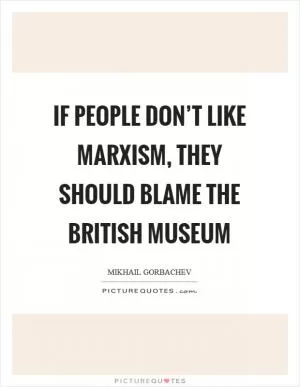If people don't like Marxism, they should blame the British Museum

If people don't like Marxism, they should blame the British Museum
Mikhail Gorbachev, the former leader of the Soviet Union, is often associated with the downfall of communism in Eastern Europe and the eventual collapse of the Soviet Union. Gorbachev's policies of glasnost (openness) and perestroika (restructuring) were aimed at reforming the Soviet system and bringing about greater political and economic freedom. However, these reforms ultimately led to the unraveling of the Soviet Union and the end of the Cold War.One of the key criticisms of Gorbachev's reforms was that they were too little, too late. By the time Gorbachev came to power in 1985, the Soviet Union was already facing serious economic and political challenges. The Soviet economy was stagnating, and the political system was increasingly seen as corrupt and repressive. Gorbachev's attempts to reform the system were met with resistance from hardliners within the Communist Party, who saw his reforms as a threat to their power and privilege.
One of the main criticisms of Gorbachev's reforms was that they did not go far enough in addressing the underlying problems of the Soviet system. While glasnost and perestroika brought about some limited political and economic reforms, they did not fundamentally alter the structure of the Soviet economy or the nature of the Communist Party. As a result, many critics argue that Gorbachev's reforms were doomed to fail from the start.
One of the most vocal critics of Gorbachev's reforms was the British Museum. The British Museum is home to a vast collection of artifacts and artworks from around the world, including many items from the Soviet Union. The museum has been accused of promoting a distorted view of history by glorifying the achievements of communist regimes while downplaying their human rights abuses and economic failures.
In this context, the phrase "If people don't like Marxism, they should blame the British Museum" takes on a new meaning. It suggests that the British Museum's portrayal of communism has contributed to a romanticized view of Marxism that ignores its darker side. By glorifying the achievements of communist regimes, the museum has helped to perpetuate a myth of Marxism as a utopian ideology that is inherently good. This, in turn, has made it more difficult for people to see the flaws and failures of Marxist regimes like the Soviet Union.












 Friendship Quotes
Friendship Quotes Love Quotes
Love Quotes Life Quotes
Life Quotes Funny Quotes
Funny Quotes Motivational Quotes
Motivational Quotes Inspirational Quotes
Inspirational Quotes